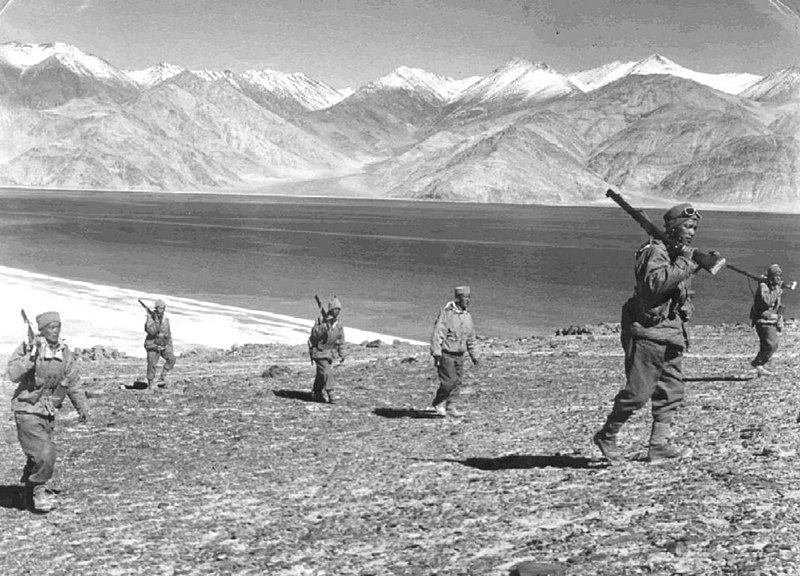
A New Narrative for 1962

During the coming weeks, via its media, China is going to reiterate Beijing’s narrative of the 1962 border conflict with India.
Already Zhang Xiaokang, the daughter of Gen Zhang Guohua, the commander of the Chinese forces who attacked India in 1962, is working on a book answering, “One Hundred Questions on the Self-Defense Counterattack on the Sino-Indian border.”
Since 1963, Communist China has termed its treacherous attack on India’s Northern borders as ‘a counter-attack’.
To commemorate the 60th anniversary, Zhang has worked with war history researchers to compile answers to these questions. She not only interviewed veterans who participated in the war, but also “collected first-hand information, reflecting the counterattack in a panoramic manner, especially stories about the heroes, meritorious soldiers, martyrs, wounded and other battle deeds of front-line commanders and front-supporting militia.”
What about the Indian narrative?
The 1962 Border Conflict
Undoubtedly the Sino-Indian conflict in October/November 1962 is the event which marked the Indian psyche the most since Independence.
The best proof of it is that even a non-Congress government at the centre has refused to declassify the Henderson-Brooks-Bhagat report written after the so-called ‘debacle’; Delhi is still prisoner of the Chinese narrative.
Indeed, the 1962 conflict with China was extremely harrowing for the people of India.
Communist China too has not forgotten the War, but uses it for different purposes, for its own propaganda, forgetting that India of the 2020s is not the India of the 1960s.
Soon after the People’s Liberation Army (PLA) started an uncalled-for confrontation in East Ladakh in May 2020, Beijing tried once again to propagate the narrative of the crushing defeat for India in 1962.
Already at the end of October 2017, as an offshoot of the Doklam episode, Sina.com published an album of photos showing ill-equipped and unprepared Indian troops who ‘dared to attack the superiorly trained Chinese troops of Gen Zhang Guohua; according to Beijing this gave Chairman Mao no option but to ‘counterattack’ and kill thousands of Indian jawans and officers.’
In 1962, disinformation and Information Warfare (IW) already existed, and President Xi Jinping probably dreamt of another 1962, when he undertook to change the Line of Actual Control in Ladakh in May 2020.
Can China repeat 1962?
The answer is a clear ‘No’.
The Indian Army in 2020 is not the Army of 1962; it is fully geared to counter any eventuality from its belligerent neighbour; it has demonstrated this during the last two years in Ladakh; today the India government no longer dreams of an utopian Hindi-Chini bhai-bhai world.
Therefore, Beijing should think twice before threatening India with a 1962 repeat and IW will not help China in any present or future confrontation.
Time to Rewrite the Narrative
Though overall the outcome of the conflict might have been disastrous and traumatic for India, this was mainly due to the lack of political leadership or the ‘politicized’ generals in the Indian Army. No use to cite again the ‘guilty men of 1962,’ as an author put it.
Undoubtedly, with better political leadership and the use of the Indian Air Force (IAF) in particular, the war could have had a different conclusion. It was indeed folly for the then political leadership not to use the IAF.
In an interview with this writer, Wing Commander Jag Mohan (‘Jaggi’) Nath, the first officer to have been decorated twice with the Maha Vir Chakra (MVC), India’s second-highest war-time military decoration, said he had been on regular missions over Tibet for more than two years from 1960 to reconnoiter the Chinese military build-up on the Tibetan plateau.
Jaggi Nath concluded that China had No Air Force on the Tibetan plateau in 1962. Unfortunately, the political leadership refused to believe the hard evidence gathered during his sorties. Had the IAF been used, the narrative of the war would have been entirely different.
The Indian soldiers and most of their officers fought well, particularly during the battles of Walong and Lagyala Gompa in the North-East Frontier Agency (NEFA) and Rezang-la in Ladakh; in many other sectors too. Though memorials have now been erected in most of these places, it is necessary to highlight the courage of the Indian troops again and again.
Take the example of one of the 2 Rajput company commanders, Major BK Pant who fought like lion and really inspired his men (killing a large number of enemies) before being overwhelmed by the PLA.
Maj Gen KK Tewari, then commander of the Signal Regiment of the 4 Mountain Division, who was taken PoW on the Namkha chu (river), writes in his memoirs: “We were told by many of our men in the PoW camp later that even after Pant was killed and his position overrun, the Chinese kept bayoneting his dead body repeatedly. They were perhaps angry because of the large number of casualties which Pant and his men inflicted on them. Otherwise, who would expect a regular army soldier to go on bayoneting a dead body in battle! This was also confirmed by a Chinese officer when we were in the PoW camp.”
Gen Tewari adds: “Maj Pant should certainly have been honoured and given a high gallantry award posthumously. But such was the state of wrong in the Indian Army hierarchy at the time, that not only did he go unrecognised but others who had run away the quickest with least regard for their command responsibilities, were given gallantry awards.”
The bravery of Pant is one of the many examples which should be highlighted.
Another Narrative
To truly understand the 1962 war with China, it is worth reading the book just published by Stanford University Press in the US: When the Iron Bird Flies – China’s Secret War in Tibet authored by the Chinese scholar Jianglin Li.
Based on Chinese archival documents (mainly from local archives in Tibet, Sichuan, Gansu and Qinghai), this “untold story reshapes our understanding of Chinese and Tibetan history,” says the blurb, which further explains: “From 1956 to 1962, devastating military conflicts took place in China’s southwestern and northwestern regions. Official record at the time scarcely made mention of the campaign, and in the years since only lukewarm acknowledgment of the violence has surfaced.”
It was what Mao called the ‘pacification of Tibet’.
Interestingly, the campaign was considered by the Chinese strategists as a rehearsal for the War against India in October 1962.
In January and February 1959, Mao Zedong wrote four reports on the situation in Tibet and gave instructions to smash the Tibetan rebellion (against the Chinese occupation). The Great Helmsman said that suppressing the Tibetans was a good thing; it could also be used to train the troops and harden the PLA into combat readiness.
Mao’s concept was known as ‘suppress the rebellion while training PLA troops’; it means that Mao was already thinking of a conflict with India.
On February 19, 1959, Mao’s training instructions’ instructions were sent to President Liu Shaoqi, Deng Xiaoping and Defence Minister Peng Dehuai as well as to the Tibet Work Committee (ruling Tibet at that time) and the Tibet Military Command …down to regiment level.
The 1962 War was not a coincidental ‘counter-attack’.
Another Angle
I have to end with something not very pleasant to write about: the role of the Ministry of External Affairs to repatriate the prisoners of war (PoWs).
On December 3, 1962, a representative of the International Committee of the Red Cross (ICRC) met AP Venkateswaran, then a deputy secretary in the Ministry of External Affairs (later Foreign Secretary).
The ICRC delegate explained that the conditions for the application of the Geneva Convention on prisoners of war were entirely fulfilled; the ICRC could intervene. Under the Convention, two parties (India and China) were to provide their lists of PoWs and facilitate the visit to the camps (which India did – some Chinese civilian nationals were being kept in Rajasthan).
The ICRC however needed a formal request from Delhi informing Beijing that India authorised the ICRC to officially take up the issue of the Indian PoWs with China.
Venkateswaran refused; he explained that the Ministry did not want to speak with Beijing or even to put such demand to Geneva in writing. Without official locus standi, the ICRC could not efficiently take up the issue with Beijing (leaving the local Indian Red Cross to correspond with its Chinese counterpart …with limited results). This delayed for months the release of the Indian PoWs; the Ministry of External Affairs did not seem concerned by the fate of the PoWs. Several other communications between Delhi and Geneva point to the same direction. It is indeed sad that the MEA was so casual about its soldiers, but it is a fact.
All this should not happen again; it will certainly not.
***********
Reference for image – Indian soldiers on patrol during the 1962 Sino-Indian border war – Sino-Indian War – Wikipedia
Disclaimer
The opinions expressed in this article are the author’s own and do not reflect the views of Chanakya Forum. All information provided in this article including timeliness, completeness, accuracy, suitability or validity of information referenced therein, is the sole responsibility of the author. www.chanakyaforum.com does not assume any responsibility for the same.
Chanakya Forum is now on . Click here to join our channel (@ChanakyaForum) and stay updated with the latest headlines and articles.
Important
We work round the clock to bring you the finest articles and updates from around the world. There is a team that works tirelessly to ensure that you have a seamless reading experience. But all this costs money. Please support us so that we keep doing what we do best. Happy Reading
Support Us





















POST COMMENTS (0)